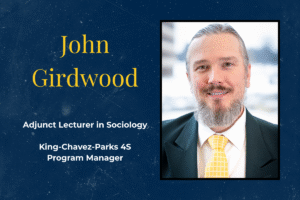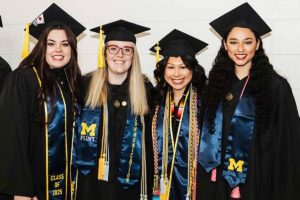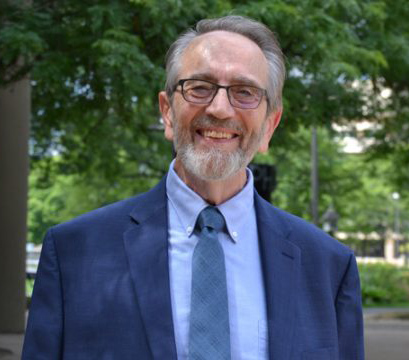
On October 6, 2016, members of UM-Flint Communication—both past and present—gathered to celebrate the newly independent department and all it has accomplished in its 30-year history.
“In 1986 when the COM degree was first introduced, the catalog noted that communication was both ‘one of the original liberal arts’ and that ‘effective communication is a basic life and career skill,’” said department chair Marcus Paroske. “That same blend of deep scholarly tradition and a healthy dose of applicable, practical skills is still a hallmark of the department 30 years later.”
Continued Paroske, “Recent changes like the new M.A in Applied Communication degree and requiring internships for all communication majors builds on that tradition of combining theory and practice, of thinking deeply about human communication and also learning how to use that knowledge in speaking, writing, and group discussion, all in a context where faculty know and care about their students.”
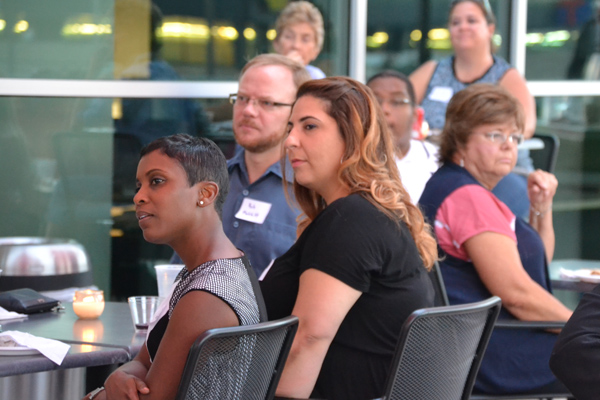
In addition to celebrating the department itself, the October 6 gathering honored Dr. Charles Apple, associate professor emeritus.
Dr. Apple joined the UM-Flint in 1986, quickly becoming a favorite faculty member and serving as its leader from 1987 to 1998.
1988 alumna Sherry Hayden noted, “I took as many courses from him as possible. His enthusiasm for teaching, for people, and for the art of communication has inspired me throughout my life. He is gifted and has freely shared his gifts with this very fortunate community of learners.”
Her sentiment was echoed by Andrea Chirich, a 1989 alumna of the program. She said, “Dr. Apple was my favorite professor! He brought much real-world practicality to the study of communication. The lesson that stuck with me the most was when he had us set up corporations…That exercise had very practical application for me in my corporate career, helping me understand how the chain of command worked, and how I could help it be more effective.”
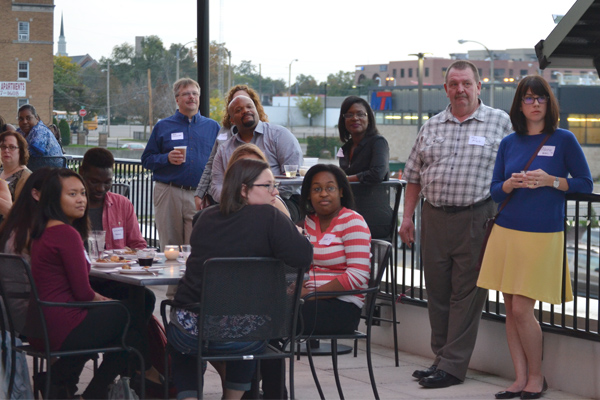
Read on as Dr. Apple shares his own memories of his career and his time at the University of Michigan-Flint:
What theories or fundamentals have changed in your field over your career? What has remained the same?
This is a tricky one as the focus of the field has changed tremendously. When I was introduced to communication theory in 1965, the field focused on speech and classical rhetorical theory with a few courses at the upper level on other areas or contexts such as persuasion, organizational communication. The essential focus was on the spoken message with some concern for nonverbal theory. As the field moved into the 1970s things took on a broader application of classical rhetorical theory. Studies emerged on the study of social movements with the inclusion of modern forms of rhetorical theory. The field began to examine many other contexts of communication with a blend of rhetoric and modern social science theory—psychology, sociology, semiotics, etc. All of this was very appealing to me as I have always been more of an eclectic than a specialist. This why many of my courses and lectures have included ideas and theories from history, psychology, philosophy, and semiotics. Today, the study of communication continues to focus on speech and debate. However, it now examines such communication contexts as mass communication, film, small groups, interviewing, organizational communication, advertising, public relations, ethics in communication, rhetorical theory, health care communication, and communication and aging.
What were/are some of your favorite classes to teach? Why were/are they important for students?
I have taught a wide range of courses especially during the first 10 years here due to the lack of full-time faculty. Ethical issues in communication, film genre, social movements, propaganda, interpersonal communication, and conflict management [are some] favorites.
I think that ethics in communication is a critical course for any communication major or minor. The world of communication is rife with cases of shady to overtly unethical behavior. Someone once said that if you do not bring your ethics with you, someone else will give you theirs. I have found this to be true when I worked for a Fortune 100 service corporation and in my study of other contexts. Over the past 29 years of my teaching this course, I have found the majority of my students saying that they have never thought of what to do in most of the cases covered. I try to create a climate in the course where each student can find their own ethical beliefs. I rarely stress my own beliefs except for stressing that I believe in the dialogical approach to communication at all times.
I also believe that a strong course in interpersonal communication can serve to prepare students for their current and future relationships including personal, friends, worker relationships, and even difficult people. I stress the critical importance of how you talk to yourself. Self-talk has been studied in psychology and makes a cornerstone for me in preparing for how we conduct ourselves in relationships. I also stress the centrality of assertiveness. I have built my course on conflict management as a follow-up to interpersonal communication. Conflict is a basic reality of every relationship and the tools and techniques of handling ourselves in conflict are critical to the creation of any successful relationship.
I believe that my classes on social movements, propaganda, and film genre help my students prepare for how to digest those who change or try to change the culture in which we live. I have been lucky to have participated in the Civil Rights Movement and even marched with Dr. King. I also took part in the anti-war movement in the late 60s and early 70s. So I have firsthand experience with this powerful form of social and cultural change. I did my dissertation for my PhD on the conflict in Northern Ireland, including the history of the entire Irish question (or the English question as the Irish preferred to frame it). Propaganda overlaps with social movements both within the pro-change side and anti-change or governmental side. As Jacques Ellul has argued, there are both political propaganda and sociological propaganda. This connects to my approach to film genre. I try to awaken within my students the need to pay attention to the historical context of each film, the cultural values in evidence, the relative power of the narrative structure and effect, and any ties or connections to our cultural mythology. I have them watch films in three genres: mysteries, westerns, and adventure epics. Such films are seen by most audiences and I feel can have a profound impact on society.
What are some highlights of having been a part of the communication program/department at UM-Flint?
I have been able to see over 500 or 600 graduates grow during their coursework and after graduation. Our grads have done very well. We have a grad in public relations who is presently placed in London. Another is a local TV news anchor. Quite a few work in departments of communication for a wide range of organization sizes. Some have gone into teaching. A few are out west in the film industry.
Over the years we have grown from a struggling-for-survival, developing program with a minimal faculty. Today there is a solid tenured faculty with a number of lecturers and part time faculty. We have graduated around 1,000 students. We have also had quite a few students who graduated with honors.
What are your hopes for the future of students in your field?
I hope that the field can maintain a balance between theory and practice. We have always been a mix, blending theory from other fields and applying it to a wide range of areas—speech, debate, sales, small group decision making, organizational effectiveness and interventions, TV and film production and critique, and so on. In my opinion we are a blend of liberal arts in terms of rhetorical criticism and practice along with modern social science theory and application.
For more information on the department, visit umflint.edu/communication or call 810.766.6679.


